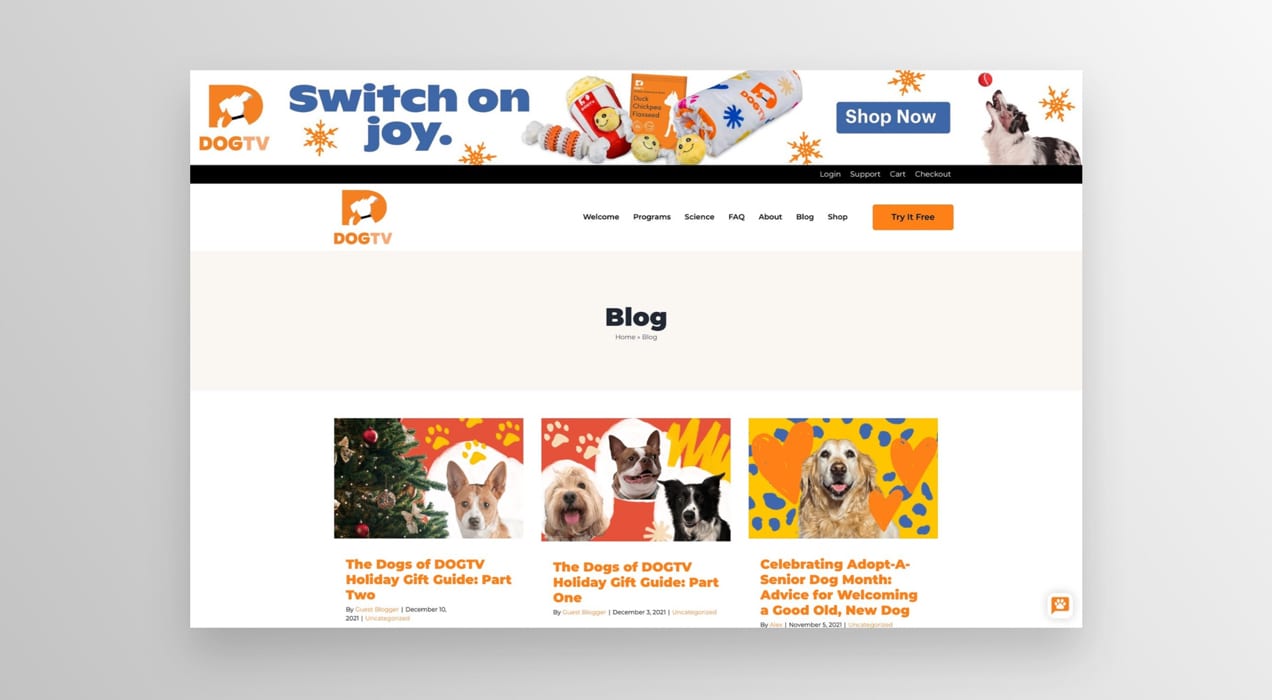Did you know there’s a simple way to get more attention for your online storefront while boosting customer satisfaction and loyalty? Adding a blog to your eCommerce website can make a big difference to your visibility and help expand your brand and messaging. Plus, since WordPress is naturally a blogging platform, adding one to a WooCommerce store is no major feat.
Five reasons your online store should have a blog
↑ Back to top1. To showcase your products
A blog is a great way to show your products in action and demonstrate how they’ll fit into potential customers’ lifestyles. You can write posts that explain what your products do, why they’re helpful, and what problems they solve for your audience.
Nine out of ten first-time visitors won’t make a purchase on your site, so providing them with detailed information that might keep them around longer or entertaining them with interesting content that will have them coming back for more, is a proven way to build trust and brand recognition.
A blog can also be a place to share news, so people can look back on important moments in your company’s history and feel like they lived the journey with you. Then you can share headlines from important events on social media, but have people click to read the full story on your site. While they’re there, they might end up doing some shopping, too!
Consider using your blog to:
- Post announcements, overviews, and back stories of your newest products
- Alert potential customers to current sales and discounts
- Catalog how-to guides for installation or configuration
- Share unusual or fun applications of your products
- Discuss major issues in your industry and educate your customers on why certain features matter
- Answer commonly asked pre-purchase questions

In addition to their gift catalog, World Vision has a top-notch news feed that shares moving stories and meaningful information about their work across the globe. It helps establish their brand for new visitors and showcase how donations are put to use, as well as keep their audience informed about new issues and causes for action.
2. To boost customer loyalty
Recurring customers are the heart of your business. Earn their loyalty by providing ongoing value in the form of blog posts.
How can you do this? One way is by highlighting a customer every week or month. Share information about them, how they’re making a difference, and ways that they use your product. Not only does this make that person feel special, it also shows others how people use and love the items you sell.
Another way is by providing ongoing tips and tricks for using your products. Show that it has more than one purpose and can make their lives better in lots of different ways.

Oysters XO uses their blog to take food to the next level. Their blog posts suggest ways to incorporate their products — oysters, of course! — into special dinners or everyday meals. Plus, they provide tips for experts and newbies alike.
3. To demonstrate your expertise
A blog is the single best way to show off your expertise. It shouldn’t always be about selling — prove to your audience that you care about their problems or genuinely hold the same passions they do. When people find themselves continually turning to you for answers to their most pressing questions, they’ll trust your recommendations and the products you endorse as well.
Showcasing your expertise can also help you network with others in your industry. The more you offer interesting, detailed information, the more others in related fields will come to you for advice or as a reference for their own customers. This can lead to guest posts and backlinks on other sites, speaking opportunities, guest appearances on podcasts, and more — all of which can grow your customer base and enhance your bottom line.
Demonstrating your authority on your own blog is great. Receiving praise and endorsements from other well-known authorities in the industry is absolutely invaluable.

Heggerty specializes in training and materials for learning to read, specifically from a phonemic approach. Many visitors aren’t super familiar with the concept Heggerty offers, but will be after a bit of time on their blog!
They make the idea of specialized language and thinking accessible to beginners, but also offer topics that more advanced audience members will appreciate.
And while doing all of this, they’re both demonstrating the power of their products and increasing their credibility to potential customers. When it’s time for visitors to make a purchase in this category, who else will they turn to?
4. To increase your search engine rankings
Search engines love blogs because they love fresh, high-quality content. If your website has barely changed since it launched and you’re wondering how to improve organic traffic, putting out new content that searchers will find valuable, interesting, and informative is a great step forward.
Blog posts can help you:
- Build internal links. In your posts, you’ll naturally link to products you reference and other articles on your site. These internal links help search engines understand which pages are most important and what your site is all about.
- Target long-tail keywords. These are detailed search terms like, “best organic lawn fertilizer for winter in New York state” that, while they see fewer searches per month than something like “lawn fertilizer,” are easier to rank for. Write posts that answer very specific questions and you may achieve the top ranking for these terms!
- Receive more backlinks to your site. The more great content you have, the more likely that someone will find it useful and want to link to it on their own site or social media profile. Search engines see backlinks as an endorsement to your site’s quality and so they can help you climb in the rankings!
- Increase user sessions and engagement. If visitors come back often and stay longer, search engines will determine that you’re providing a quality experience and be more likely to share your site with other users by bumping you up in the rankings.

Shop Catalog shares resource lists about specific topics, like books for new parents, readers of poetry, or astrology lovers. With their great use of keywords and their content that’s perfect for targeted audiences, they’re helping search engines figure out what they have in their WooCommerce shop, and helping shoppers find what they need — a win-win.
5. To build your own library of social media content
Regular social media content connects with new shoppers and engages current customers. If you’re working to show off your brand on Facebook, Instagram, Twitter, or Pinterest, then you’re always on the lookout for great content to share that your followers will appreciate and value.
As you build up a library of articles that are just what your audience is looking for, your social media job will become easier. Information that never goes out of style — like gift guides, how-to articles, or customer profiles — can be shared multiple times a year. Plus, the more you share your own content on social platforms, the more likely those posts are to be re-shared by other brands and your own clientele, spreading your name and pulling in new website visitors on a wider scale.

DogTV has a strong social media presence on multiple platforms and an active online community that loves to hear tips and swap stories about their furry friends. Their WordPress blog is a great place for them to compile information and create valued articles for their loyal followers, but it also provides fodder for their social media groups.
How to make it happen
↑ Back to topReady to start blogging? If you’re using WooCommerce, you’re already most of the way there! WooCommerce combined with WordPress provides a built-in, free blogging platform that perfectly integrates with any store. Here’s what you need to do:
- Create a new, blank page. Title it “Blog” (or “news” or “stories” or whatever you’d like).
- In the WordPress dashboard, go to Settings → Reading. Select your new page in the dropdown beside Posts page. Click the blue Save Changes button at the bottom.
- Then, start creating posts! You can do so by going to Post → Add New. Then, add content like text, images, and videos using the same block editor that you used for your site pages. Make sure to add a featured image if you’d like a picture to show up in your blog feed.
- Add your new page to your main menu. Go to Appearance → Menus and find the primary menu. Check the box beside your page in the list to the left, then click Add to Menu. Finally, press the blue Save Menu button.
That’s all you need to do! Want more details? Check out the WordPress documentation on using the block editor.
Tips for a successful blog
↑ Back to topHere are just a few tips to help you have a successful start:
- Keep a list of ideas for types of posts to write. Immediately jot them down as you think of them. Determining ideas can often be harder than writing the posts themselves so this will help you avoid blockers.
- Settle on three to five main categories when you first start. You can then label each post based on the category(ies) they fall under. Categories help users sort posts by interest and help you build enough credibility about a specific topic to gain the attention of search engines.
- Use lots of images in your posts. These keep people engaged and give you another opportunity to tell search engines what your post is all about by labeling them with proper alt text.
Grab a pen (or keyboard)!
↑ Back to topIt’s time to start writing. Don’t worry about being perfect. Share your expertise, what you’re passionate about, and what you’d want to read. Be helpful and entertaining and avoid being a salesperson.
Keep it light, focus on things related to your products and services (or the things people using your products and services enjoy), remain consistent, and you’ll find your audience!
Blogging is a low-cost way to find more customers. If you have the desire, you can attract more business! Get started today.
About





